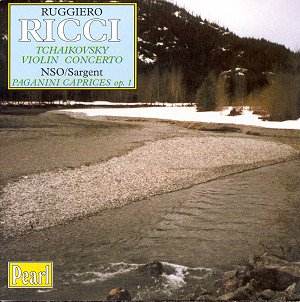Ruggiero Ricci recently (2002) announced his retirement
from the concert platform after a lifetime’s performing. Slightly younger
than Menuhin, with whom he was sometimes contrasted, he has a huge discography
to his credit ranging from standard repertoire through finger-busting
gymnastics to works on the esoteric fringe of the contemporary repertoire.
The recordings here are from what sleeve-note writer and noted collector,
Raymond Glaspole, calls Ricci’s 'years of maturity' – that is, his early
thirties. No longer the scintillating prodigy not yet the middle aged
soloist, these Decca LPs find him in something approaching prime form.
I have to admit that I was surprised how good the Tchaikovsky sounds.
He was to re-record the work with Sargent – on that occasion with the
LSO – a decade later but back in 1950, in these excellent sounding discs,
he evinces real style and his own brand of bravura in the Concerto.
There are some fairly typical of-their-time textual emendations to the
score but there is much to admire in Ricci’s typically forthright and
extrovert performance.
The galvanizing violin run at 4.50 in the first movement,
with its rubato maybe slightly theatrically imposed, is exciting (but
doesn’t it seem just slightly artificial?). Ricci’s vibrato is exceptionally
fast, as ever, though it’s not, in this recording, as violently oscillatory
as it could sometimes become and sounds here under firm control. He
is vibrant, expressive with no gauche slides and good finger position
changes. Sargent is an excellent foil for Ricci and shapes the work
with excellently contoured understanding. Listen, for example, at 4.10
into the second movement where both soloist and conductor prepare the
lyrical argument with superbly timed aplomb. Maybe there is some rather
smeary playing from the soloist and a little – surely forgivable – sentimentalising
though Ricci’s attitude to such criticism would doubtless be as robust
as his playing – he was once quoted as saying that it was "better
to be a prostitute than a nun" and, translated into musical terms,
that meant overplay rather than understate. The finale is steady and
effective, one small intonational blemish aside, albeit that it’s not
the most convulsive and propulsive account or one that I’d assumed it
would be.
Ricci’s 1950 account of the Caprices was the
first to be recorded. Without the accustomed and inauthentic piano accompaniment
these recordings are a testament to his daring. Despite the rather unsympathetic
acoustic Decca provided there is no doubting Ricci’s vigorous and fearless
playing. These performances are, despite his almost legendary reputation,
not unimpeachable technically but the compensations are many and there
is some splendidly trenchant and acute playing here. One can detect
his rather intense vibrato in the Octaves study, No 3, obtrusively
so to my ears but also how well he sustains melodic line in the Thirds
study. One could hardly expect scrupulously clean playing – and it’s
not – but the fifth Caprice is stunningly good and the tremolo
study equally good. Finally listen as he sustains the melody in No 11
and the way in which he integrates the contrastive elements of these
fiendish studies. This is a fine, mid-period salute to a violinist of
exceptional and highly personalized gifts.
Jonathan Woolf


